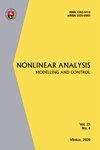Modelling asthma development in a population with genetic risk and polluted environment
IF 2
3区 数学
Q1 MATHEMATICS, APPLIED
引用次数: 0
Abstract
Environmental pollutant continues to pose a great threat to public health, leading to development of chronic diseases. In this study, a nonlinear mathematical model is formulated and analysed to study the effect of genetic risk, environmental pollutant, public health education/awareness on asthma development. Conditions for the existence of the unique positive steady state and permanence of the system are assessed. Using Lyapunov function analysis, the unique positive steady state is locally and globally asymptotically stable. Results reveal that genetic risk, pollutant emission rate, effective exposure rate of population to polluted environment and recurrence rate contribute to asthma prevalence. However, sufficiently effective pollutant reduction strategies, improvement in compliance to public health education/awareness together with human dependent environmental pollutant depletion lead to a marked reduction in disease prevalence.在有遗传风险和环境污染的人群中模拟哮喘的发展
环境污染物继续对公众健康构成巨大威胁,导致慢性病的发展。在本研究中,建立并分析了一个非线性数学模型,以研究遗传风险、环境污染物、公共卫生教育/意识对哮喘发展的影响。评估了系统存在唯一正稳态和持久性的条件。利用李雅普诺夫函数分析,该系统的唯一正稳态是局部和全局渐近稳定的。结果表明,遗传风险、污染物排放率、人群对污染环境的有效暴露率和复发率对哮喘患病率有影响。然而,足够有效的污染物减少战略、对公共卫生教育/意识的遵守情况的改善,以及依赖人类的环境污染物的减少,导致疾病流行率显著降低。
本文章由计算机程序翻译,如有差异,请以英文原文为准。
求助全文
约1分钟内获得全文
求助全文
来源期刊

Nonlinear Analysis-Modelling and Control
MATHEMATICS, APPLIED-MATHEMATICS, INTERDISCIPLINARY APPLICATIONS
CiteScore
3.80
自引率
10.00%
发文量
63
审稿时长
9.6 months
期刊介绍:
The scope of the journal is to provide a multidisciplinary forum for scientists, researchers and engineers involved in research and design of nonlinear processes and phenomena, including the nonlinear modelling of phenomena of the nature. The journal accepts contributions on nonlinear phenomena and processes in any field of science and technology.
The aims of the journal are: to provide a presentation of theoretical results and applications; to cover research results of multidisciplinary interest; to provide fast publishing of quality papers by extensive work of editors and referees; to provide an early access to the information by presenting the complete papers on Internet.
 求助内容:
求助内容: 应助结果提醒方式:
应助结果提醒方式:


